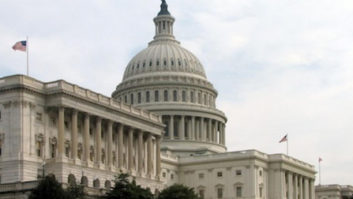Broadcasters are telling the Supreme Court that a lower court’s rejection of the FCC’s broadcast deregulation decision was a recipe for “judicial intervention run riot” and that diversity alone cannot be invoked to block deregulation of rules that marketplace changes have rendered unsupportable and no longer necessary in the public interest.
In a reply brief in advance of Jan. 19 oral argument, the National Association of Broadcasters told the High Court that the U.S. Court of Appeals for the Third Circuit “required the commission to treat a policy never mentioned in Section 202(h) as a mandatory and dispositive factor, fly-specked the commission’s analysis, ordered the Commission to collect additional data, entered a triply overbroad remedy, and finished up by reasserting perpetual jurisdiction,” it told the court.
NAB wants the Supremes to clear the way for the FCC finally to achieve the “regulatory reform” Congress set in motion 25 years ago. That is when it called on the FCC in the 1996 Telecommunications Act to eliminate regulations no longer necessary in light of competitive changes in the marketplace.
Broadcasters are appealing a Third Circuit Court of Appeals stay of FCC media ownership deregulation. That was the FCC’s November 2017 decision to eliminate the newspaper-broadcast and the radio-TV cross-ownership rules; allow dual station ownership in markets with fewer than eight independent voices after the duopoly, creating an opportunity for ownership of two of the top four stations in a market on a case-by-case basis (the FCC is not calling it a waiver); eliminate attribution of joint sales agreements as ownership; and create an incubator program.
The court said the FCC had not sufficiently gauged the impact of those changes on minority and female ownership, as the court had told the FCC it must do the last time the circuit weighed in on the FCC’s long-standing attempts to loosen regulations on broadcasters.
But NAB, in its brief filed Friday (Jan. 8) reiterated that the assertion by those defending the Third Circuit decision that the FCC can keep its ownership limits “for the sole purpose of promoting minority and female ownership finds no support in the statute’s text …”
In fact, NAB said, the statute needs to be read in a proderegulatory context, not one in which the FCC can retain or even toughen ownership restrictions “based on any factor under the sun.”







